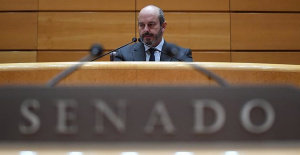He shows his affection and admiration for Felipe González and underlines that the former president said that he should read the law before giving his opinion
MADRID, 6 Jul. (EUROPA PRESS) -
The Minister of the Presidency, Relations with the Courts and Democratic Memory, Félix Bolaños, has come out against criticism of the Democratic Memory Law and has responded to former President José María Aznar that these can only be carried out from "ignorance" or the attempt of "grossly manipulating" what the norm says.
This Tuesday, Aznar described the new law as "nonsense", whose opinion went ahead this week in the Constitutional Commission of Congress thanks to the support of EH Bildu, PNV and PDeCAT together with PSOE and United We Can, among other things because it is a project " made and agreed with terrorists," he said.
The former president specifically referred to the point of the law that marks that victims of human rights violations will be recognized until 1983, which includes the first year of Felipe González's government. "When a government like the current one agrees with the group that represents terrorism, that crimes be investigated until December 1983, five years after the Constitution was approved, at a time when the predecessors of the current government itself were already in government, I sincerely believe that this means having a very messy house", Aznar has sentenced.
Therefore, Bolaños has responded to Aznar and "to the entire right and extreme right" asking that the law be read because, in his opinion, only from ignorance or attempted manipulation "can the things that are being said be affirmed", has lamented.
He went on to defend that the law condemns Franco's dictatorship, pays homage to the victims "of both sides" of the war, values the Transition and the Amnesty Law of 1977 as fundamental elements of democracy and claims the Constitution as a fundamental pillar of the democratic system in Spain.
"Why are the right and the far right against it, why can't Spain have a Memory Law like the countries around us that have suffered dictatorships. When is the right going to really drop the ballast with the Franco regime once and for all? for all?", has questioned.
On the contrary, when asked about the statements of the former socialist president, Felipe González - who stated that the agreement with Bildu to carry out the aforementioned rule does not "sound good" to him - the minister has limited himself to pointing out his "affection" and "admiration" towards González and has underlined that he stated that "he had to read the law to give his opinion".
The former socialist leader was also asked this Tuesday about the point of the law that recognizes the victims of human rights violations until 1983. This would include those who suffered torture or were the object of the so-called 'dirty war' against ETA during the subsequent five years. to the approval of the Constitution and could affect the GAL in the first year of the Government of Felipe González, which he arrived in October 1982. In this regard, Felipe González indicated that he has not seen the text: "When I see it I will tell you , but blowing my nose, it doesn't sound good to me".
On his side, Minister Bolaños has described the rule as a step forward that is also validated "by all international organizations", as he has transferred and is based on the humanitarian principles of "truth, justice and reparation" and homage to the victims. .
For the foregoing reasons, he considers it a law "essential to dignify our democracy", and therefore believes that "only if the law has not been read" or "they want to rudely manipulate" statements such as those being made by "the right and the extreme right", as indicated.

 Exploring Cardano: Inner Workings and Advantages of this Cryptocurrency
Exploring Cardano: Inner Workings and Advantages of this Cryptocurrency Seville.- Economy.- Innova.- STSA inaugurates its new painting and sealing hangar in San Pablo, for 18 million
Seville.- Economy.- Innova.- STSA inaugurates its new painting and sealing hangar in San Pablo, for 18 million Innova.- More than 300 volunteers join the Andalucía Compromiso Digital network in one month to facilitate access to ICT
Innova.- More than 300 volunteers join the Andalucía Compromiso Digital network in one month to facilitate access to ICT Innova.-AMP.- Ayesa acquires 51% of Sadiel, which will create new technological engineering products and expand markets
Innova.-AMP.- Ayesa acquires 51% of Sadiel, which will create new technological engineering products and expand markets The amnesty faces its final stretch in the Senate with the question of whether it will be voted this week or after the Catalan elections.
The amnesty faces its final stretch in the Senate with the question of whether it will be voted this week or after the Catalan elections. The PP will send to Moncloa the 1,136 letters from citizens with their real problems that it received in Sánchez's reflection
The PP will send to Moncloa the 1,136 letters from citizens with their real problems that it received in Sánchez's reflection Carola Miró, wife of former president of the Generalitat Quim Torra, dies
Carola Miró, wife of former president of the Generalitat Quim Torra, dies 12M.- Díaz asks Sánchez to recognize the Palestinian State in the next Council of Ministers
12M.- Díaz asks Sánchez to recognize the Palestinian State in the next Council of Ministers How Blockchain in being used to shape the future
How Blockchain in being used to shape the future Not just BTC and ETH: Here Are Some More Interesting Coins Worth Focusing on
Not just BTC and ETH: Here Are Some More Interesting Coins Worth Focusing on A sensor system obtains the fingerprint of essential oils and detects if they have been adulterated
A sensor system obtains the fingerprint of essential oils and detects if they have been adulterated Faraday UPV presents the 'Origin' rocket to exceed 10 km of flight: "It is the beginning of the journey to space"
Faraday UPV presents the 'Origin' rocket to exceed 10 km of flight: "It is the beginning of the journey to space" The Generalitat calls for aid worth 4 million to promote innovation projects in municipalities
The Generalitat calls for aid worth 4 million to promote innovation projects in municipalities UPV students design an app that helps improve the ventilation of homes in the face of high temperatures
UPV students design an app that helps improve the ventilation of homes in the face of high temperatures A million people demonstrate in France against Macron's pension reform
A million people demonstrate in France against Macron's pension reform Russia launches several missiles against "critical infrastructure" in the city of Zaporizhia
Russia launches several missiles against "critical infrastructure" in the city of Zaporizhia A "procession" remembers the dead of the Calabria shipwreck as bodies continue to wash up on the shore
A "procession" remembers the dead of the Calabria shipwreck as bodies continue to wash up on the shore Prison sentences handed down for three prominent Hong Kong pro-democracy activists
Prison sentences handed down for three prominent Hong Kong pro-democracy activists ETH continues to leave trading platforms, Ethereum balance on exchanges lowest in 3 years
ETH continues to leave trading platforms, Ethereum balance on exchanges lowest in 3 years Investors invest $450 million in Consensys, Ethereum incubator now valued at $7 billion
Investors invest $450 million in Consensys, Ethereum incubator now valued at $7 billion Alchemy Integrates Ethereum L2 Product Starknet to Enhance Web3 Scalability at a Price 100x Lower Than L1 Fees
Alchemy Integrates Ethereum L2 Product Starknet to Enhance Web3 Scalability at a Price 100x Lower Than L1 Fees Mining Report: Bitcoin's Electricity Consumption Declines by 25% in Q1 2022
Mining Report: Bitcoin's Electricity Consumption Declines by 25% in Q1 2022 Oil-to-Bitcoin Mining Firm Crusoe Energy Systems Raised $505 Million
Oil-to-Bitcoin Mining Firm Crusoe Energy Systems Raised $505 Million Microbt reveals the latest Bitcoin mining rigs -- Machines produce up to 126 TH/s with custom 5nm chip design
Microbt reveals the latest Bitcoin mining rigs -- Machines produce up to 126 TH/s with custom 5nm chip design Bitcoin's Mining Difficulty Hits a Lifetime High, With More Than 90% of BTC Supply Issued
Bitcoin's Mining Difficulty Hits a Lifetime High, With More Than 90% of BTC Supply Issued The Biggest Movers are Near, EOS, and RUNE during Friday's Selloff
The Biggest Movers are Near, EOS, and RUNE during Friday's Selloff Global Markets Spooked by a Hawkish Fed and Covid, Stocks and Crypto Gain After Musk Buys Twitter
Global Markets Spooked by a Hawkish Fed and Covid, Stocks and Crypto Gain After Musk Buys Twitter Bitso to offset carbon emissions from the Trading Platform's ERC20, ETH, and BTC Transactions
Bitso to offset carbon emissions from the Trading Platform's ERC20, ETH, and BTC Transactions Draftkings Announces 2022 College Hoops NFT Selection for March Madness
Draftkings Announces 2022 College Hoops NFT Selection for March Madness




























